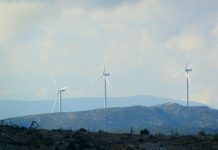Oil major-in-transition BP says industrial purchasers of ‘blue’ hydrogen – electrolysed from fossil fuel gas – are queuing up to buy from its intended cracker plant in Teesside’s giant new freeport.
Outlined earlier this year, the project will be situated in Teesside Freeport, at 4,500 acres reportedly the biggest of Britain’s eight intended light tax zones. Its backers says it will create as many as 18,000 skilled jobs over five years.
By 2030 the H2 Teesside project should be producing 1GW per year of ‘blue’ H2, according to BP, one fifth of the UK’s target.
As many as two million tonnes of CO2 each year will be captured and sent to storage, a product of the oil industry’s Steam Methane Reforming (SMR) process.
Hard-to-decarbonise applications such as shipping, aviation, heavy road haulage, possibly even home heating, will benefit.
‘Blue’ hydrogen, using steam to divide methane chemically, has met scathing criticism from environmental activists and NGOs arguing for a zero carbon economy.
In a blog last November, international researchers Global Witness questioned the continued use of methane as a hydrogen feedstock, entirely avoidable when the planet’s super-abundant water can already be split using 100% renewable electricity.
Technologies for storing blue hydrogen’s residual carbon have proved over decades to be hard to scale up, the NGO argued. It cited IEA data, which the NGO claimed maintained capture methods associated with blue hydrogen seize only 60% of carbon emissions.
The blog also quoted an Imperial College paper from August 2018 as saying that even if CCS could be made 100% efficient, blue hydrogen would remain a major contributor to overall emissions.
Drumming up commercial interest for H2 Teesside, Louise Jacobsen Plutt, BP’s senior vice president of hydrogen, said: “Teesside has all the attributes of a world-class clean hydrogen hub – the right natural resources, concentrated demand, potential for hydrogen storage and pipelines, ample access to CCUS and the right skills base,”.
“While the impact of investments may be felt most acutely in the north-east, the decarbonisation benefit of H2Teesside is expected to be felt countrywide. Ultimately, these memos of understanding show how supply and demand can work together to accelerate the growth and delivery of a hydrogen economy.”



